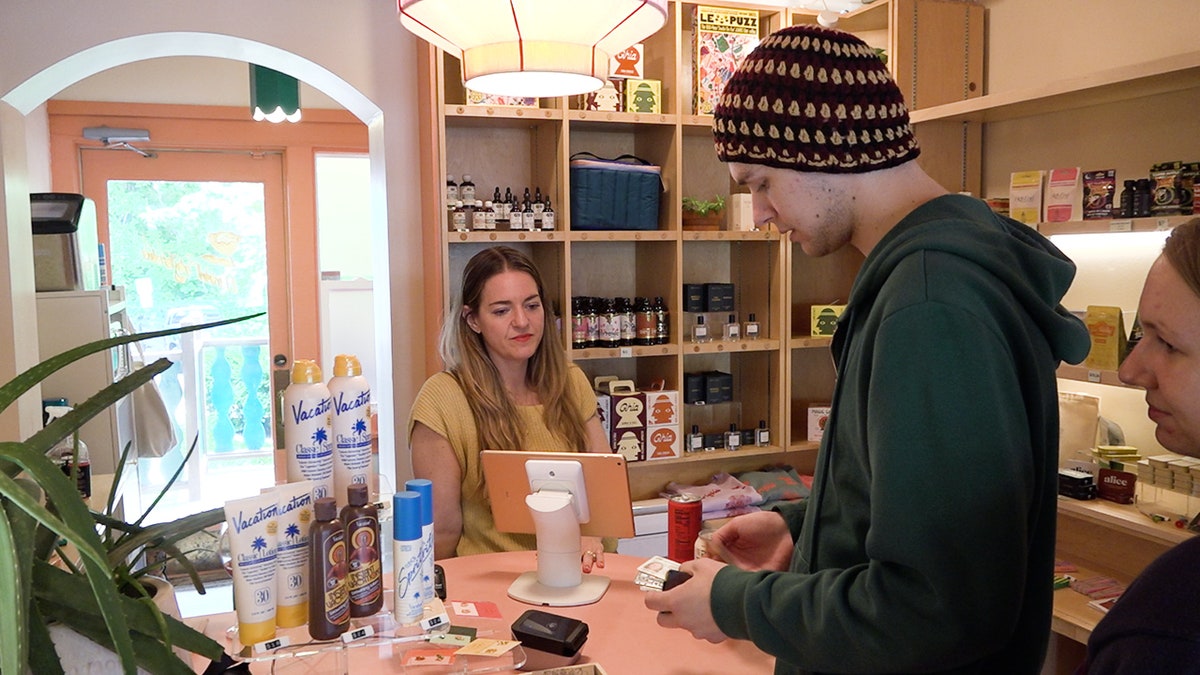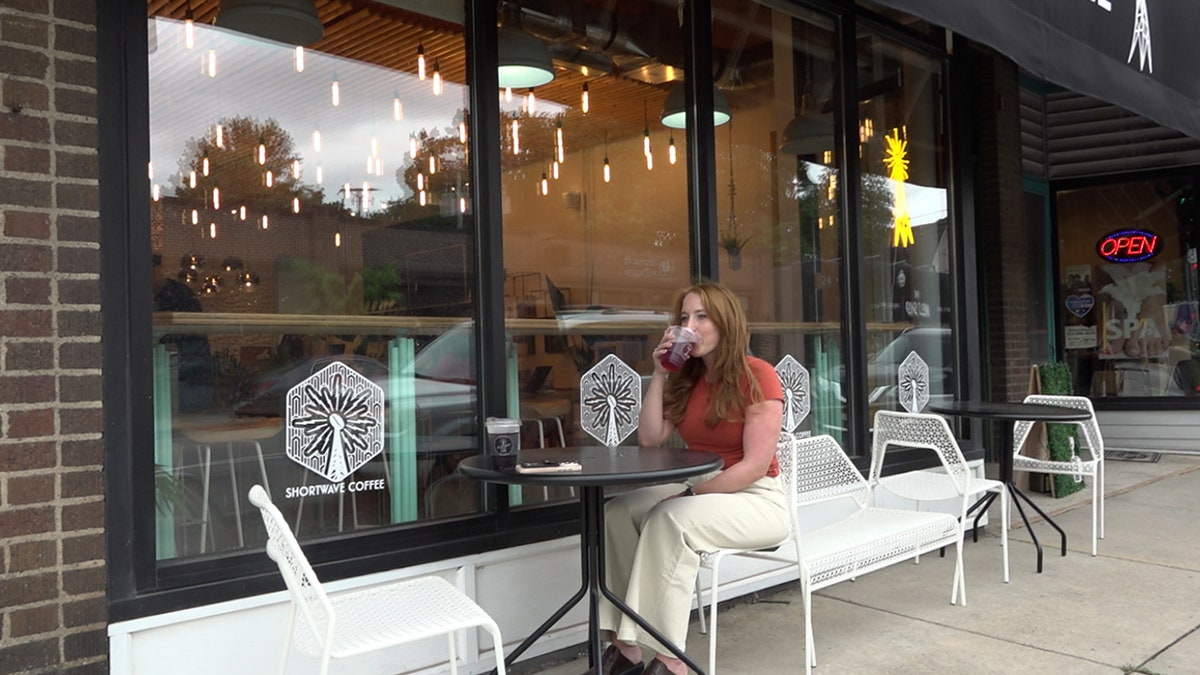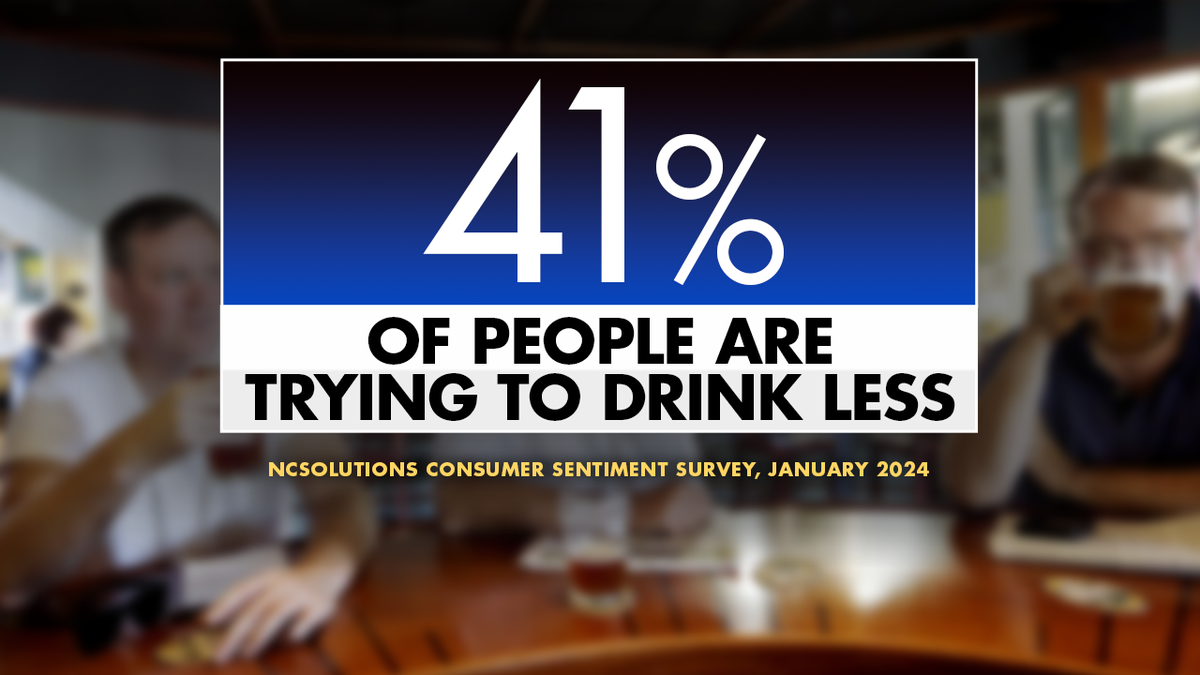Sober curiosity rising: How Americans are redefining socializing in a drinking culture
The number of Americans with alcohol use disorder nearly doubled from 2019-2022. But some studies show that over 40% of Americans are trying to drink less this year.
MINNEAPOLIS – A movement called "sober curious" is helping some people rethink their relationship with alcohol, making them mindful of when they choose to drink instead of imbibing out of habit.
One result of this is a rise of non-alcoholic (NA) bottle shops popping up across the country. Erin Flavin is the owner of two such shops in the Minneapolis-Saint Paul area. Like many people, she realized she was drinking too much during the pandemic.
"Happy hour got earlier and earlier each day, especially with how stressful it was homeschooling a seven-year-old and having a three-year-old run around," Flavin said.

According to the 2022 National Survey on Drug Use and Health, 10.5% of people 12 and older had alcohol use disorder in the last year. That’s up from 5.3% of the same population in 2019. (Fox News/Mills Hayes)
At Flavin’s business, Marigold, one can find THC and mushroom-infused drinks. One of her most popular products are her adaptogen drinks, which contain herbs that support the body’s ability to deal with stress.
"I’m 46, and I actually want to know how I feel. I’m learning how to deal with my problems in a healthy way," Flavin said.
According to a NCSolutions Consumer Sentiment Survey in January, drinking culture in the U.S. is changing. More than 40% of Americans said they wanted to drink less this year. Around 84% of people still feel drinking is a big part of America’s culture, which is down 9% from 2023.
A USA Today article shows that North Dakota and Wisconsin are two states with the highest rate of binge-drinking, with 25.99% of people 12 and older reporting binge-drinking in the past month. Millennial Kelsey Bank, a Wisconsin native, echoes that study.
"The drinking culture there was so much like a party every weekend. You go out every night. You have fun with your friends," Bank said.
ALCOHOL-FREE BEER IS BOOMING: 5 BRANDS AND 3 REASONS BEHIND THE NO-BUZZ BUZZ
Bank said she typically avoided alcohol during the week but was drinking about 10 drinks per weekend, which is considered alcohol abuse.
"I think the sober curious movement kind of helped me take those steps to first changing my relationship with alcohol," Bank said. "At six months, I’ve lost 20 pounds. I don't need my medication for blood pressure, and it's just made such a difference in my health journey. And like how I feel inside and out."
Bank said she’d once completed Dry January. This year she decided to start early and commit to being sober curious after January concluded. By the third week she was ready for a bloody mary or a beer, but health podcasts and books about being sober curious helped her stick to her plan.
"It can be kind of hard to get out of your shell without alcohol as that social lubricant. So, it took me some time to kind of figure out how to be myself without alcohol," Bank said.

Erin Flavin enjoys talking with customers at her NA bottle shop. She says most people are curious about her offerings. "There's so many things to be able to drink and experiment with that have that same kind of social effect that alcohol can without the consequence," Flavin said. (Fox News/Mills Hayes)
Market research company Fior Markets estimates that the global non-alcoholic beverage market will grow from $923 million to $1.7 billion by 2028.
But alcohol misuse is far from over.
"The most prevalent substance use that we treat is still alcohol," said Lydia Burr, director of clinical services at Hazelden Betty Ford in Saint Paul.
STOUT POPULARITY AT ‘ALL-TIME HIGH’ AMID BOOMING FEMALE INTEREST, NEW ALCOHOL-FREE OPTIONS
Across the country, Burr says there are a lot of people with opiate-use disorders or issues with marijuana. She says substance use is on the rise across the board, no matter the person’s age.
"I think it's really important that people know that there's no safe amount of alcohol to consume. There's no healthy amount to consume," Burr said. "But that doesn't mean that consuming it automatically means somebody has a substance-use disorder. The vast majority of the population is able to consume alcohol without negative consequence."
Although many people use substances to deal with their anxiety, depression or other mental health issues, Burr says there are solutions to treat or manage these problems, like evidence-based practices and coping skills.

Cutting down her alcohol intake helped Kelsey Bank lose weight and stop her blood pressure medicine. "I love to take a wineglass, like a big beautiful wineglass, and I put any kind of like La Croix or my own little mocktail in it," Bank says. She still drinks on some special occasions, but says changing her drinking habits has been a positive experience for her. (Fox News/Mills Hayes)
Market research company Fior Markets estimates that the global non-alcoholic beverage market will grow from $923 million to 1.7 billion by 2028.
But alcohol misuse is far from over. Lydia Burr is the director of clinical services at Hazelden Betty Ford in Saint Paul. She graduated from an addiction studies program in 2011.
"The most prevalent substance use that we treat is still alcohol," Burr said.
STOUT POPULARITY AT ‘ALL-TIME HIGH’ AMID BOOMING FEMALE INTEREST, NEW ALCOHOL-FREE OPTIONS
Across the country, Burr says there are a lot of people with opiate-use disorders or issues with marijuana. She says substance use is on the rise across the board, no matter the person’s age.
"I think it's really important that people know that there's no safe amount of alcohol to consume. There's no healthy amount to consume," Burr said. "But that doesn't mean that consuming it automatically means somebody has a substance-use disorder. The vast majority of the population is able to consume alcohol without negative consequence."
Many people use substances to deal with their anxiety, depression or other mental health issues. Burr says there are other solutions to treat or manage these problems, like evidence-based practices and coping skills.

The NCSolutions Consumer Sentiment Survey shows more than 40% of Americans want to drink less this year. The number is even higher for Gen Z Americans, with 61% saying they plan to drink less. Nearly half of all millennials say they're doing the same. (Fox News/Mills Hayes)
"There is help out there," Burr said. "Treatment doesn't necessarily mean residential 24-hour treatment. There is some form of treatment and help that can fit with their lives. We're looking to meet people where they're at."
Zero Proof Nation tracks non-alcoholic beverage shops and bars across the world. Laura Silverman was over a decade sober when she created the site in 2019.
LARKIN POE PROMOTES SOBER POSITIVITY IN MUSIC: GOOD MENTAL HEALTH, RELATIONSHIPS ‘CAN BE COOL, TOO’
"There were no nonalcoholic bottle shops in 2019," Silverman said. "Every day the number is slightly different, but we're getting close to 300 fully alcohol-free establishments."
Silverman prides herself on helping people find NA options wherever they go, because for so long, she didn’t have that option.
"People are finding that they don't want to drink as much anymore," Silverman said, adding that NA drinks are not just for people who are completely sober. "But people who are getting older, or they have young kids, they're athletes, and they're training for a marathon or something important in their lives.
"A lot of people have important jobs where alcohol isn't conducive to functioning and being on top of their game. And of course, there are people who are very much into wellness."
CLICK HERE TO GET THE FOX NEWS APP
Silverman recalled being sober in her 20s over a decade ago. She said it made her feel like the odd man out when ordering a soda at the bar. But NA beverages are different. They allow people to fit in with the American drinking culture, whether they are fully sober or not.
"It really is a great time for people to explore their sober curiosity or to explore this whole new world of beverages," Silverman said.






















